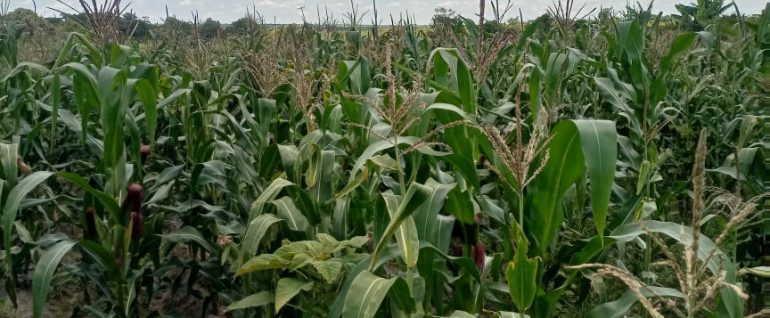During the past three installments of our conversation with Humphrey Sekeleti about his farm in the Sinda District in the Eastern part of Zambia, we have seen how he had to adjust to reality when he realized the time it would take for the fish farm to start producing and how he was able to turn this challenge into an opportunity and create multiple projects come out of it.
After he had gotten the fish ponds running, he started on the citrus orchard. He planted one hundred lemon, orange, and peach trees, together with bananas, in an area of 140 X 70 meters. Since the trees were grafted, they already started to bear fruit. But what was the biggest challenge in setting up and maintaining the orchard?
“There were many challenges during the process and after we had set it up”, Humphrey tells me. “First, clearing the area was much harder work than we had anticipated, and we had to overcome that by working harder, then we had water issues, as we have mentioned before (see previous posts), and then we suffered from animals straying into the orchard and damaging the seedlings and the work we were doing, so we had to fence off the area at an extra cost. Finally, after we had secured the area from animals, we faced attacks from pests and diseases”.
What was the most serious of the pests and diseases? “The Citrus Black Spots. It is a citrus disease caused by a fungus, which affects citrus plants throughout subtropical climates, reducing both fruit quantity and quality. We use copper fungicides to control this disease. The first spray should be applied when the spring flush leaves are 1/4 -1/2 expanded. The second spray should be applied when the leaves approach full expansion to reduce infection on the fruit. So far it we have been able to control the problem this way”.
Humphrey’s next project was a 140 X 140 meters vegetable garden. He divided the land evenly between Cabbage, Rape, Chinese Cabbage, Eggplant, and Green Peppers. And I had several questions about that.
Why did you choose these vegetables for your garden? “I did choose them for mainly two reasons. First, all these vegetables are in high demand here. If you do not have a market for your crops, you are growing the wrong crops. Second, they are relatively easy to maintain in the climate and environment I am in. We have planted the right vegetables so we can plant and harvest all year round, and in that way maintain stable cash flow”.
Do you have any favorites? “Well, Rape, Cabbage, Green Pepper, and Chinese Cabbage I must consider my favorites, since they are the easiest to maintain, and have a quick turnover.”
But then what are your most challenging vegetables? “Tomatoes and Okra. These are more sensitive and less resistant to pests and diseases, so I have to be more vigilant with them. But, if the market is good, then all the effort is worth it”, Humphrey adds.
What have been your biggest challenges regarding the vegetables? “Again, it is water, and it will be until we have solved the issue of having just one borehole for the whole farm. The distance to the market is also a challenge. We are quite remote here, and the long ride to the market increases my cost, and takes up valuable time”.
There are never empty answers when I talk to Humphrey. He has thought about his projects and made a plan for each of them while staying flexible enough to adjust and adapt when facing challenges or changing environments.
In addition to the vegetables, he has been cultivating maize and watermelons, but we will keep that for another post later.
Finally, I wanted to know what practices Humphrey uses on his farm. If he systematically uses crop rotation, intercropping, and other methods. “I use crop rotation as a preventive measure for pests and diseases, and also for soil nutrition. The frequency depends on the crop, soil testing, and if any event requires immediate rotation. We are young so we cannot refer to a long experience of these practices, we are learning, talking to experienced farmers, reading, and asking questions. I have not used intercropping yet, but I am studying it and evaluating if it will improve my overall yield in the future”.
In our next posts with Humphrey, we will be talking to him about his future and the plans he has for his farm.
Stay put and follow Agri Project Africa for the whole story and other stories like this. Please share Humphrey’s story on your platforms.










